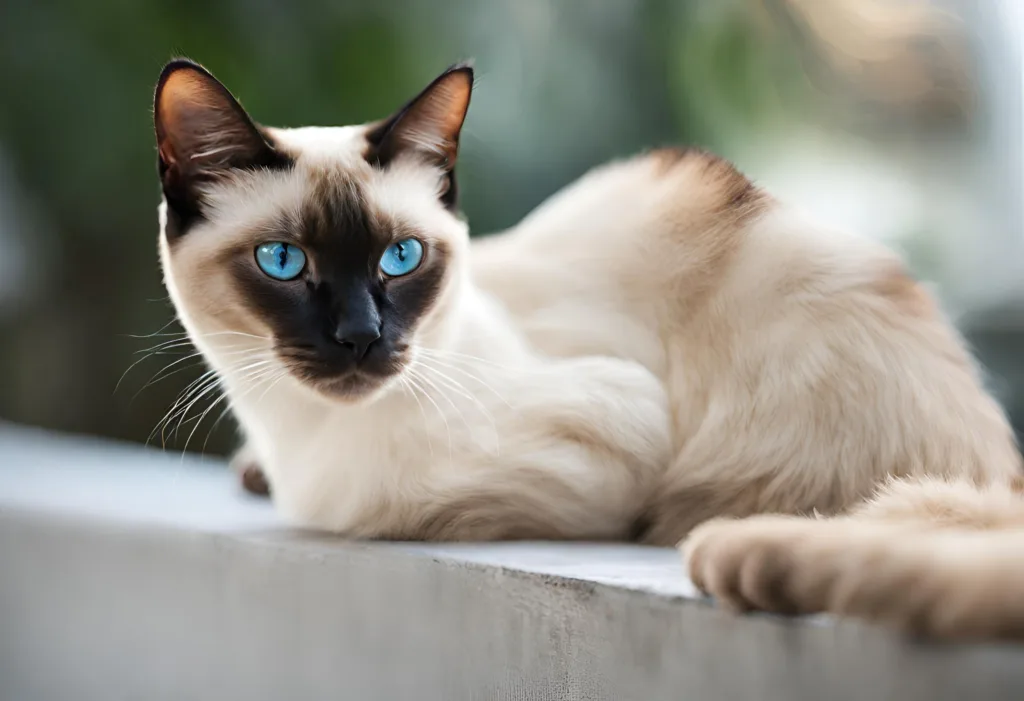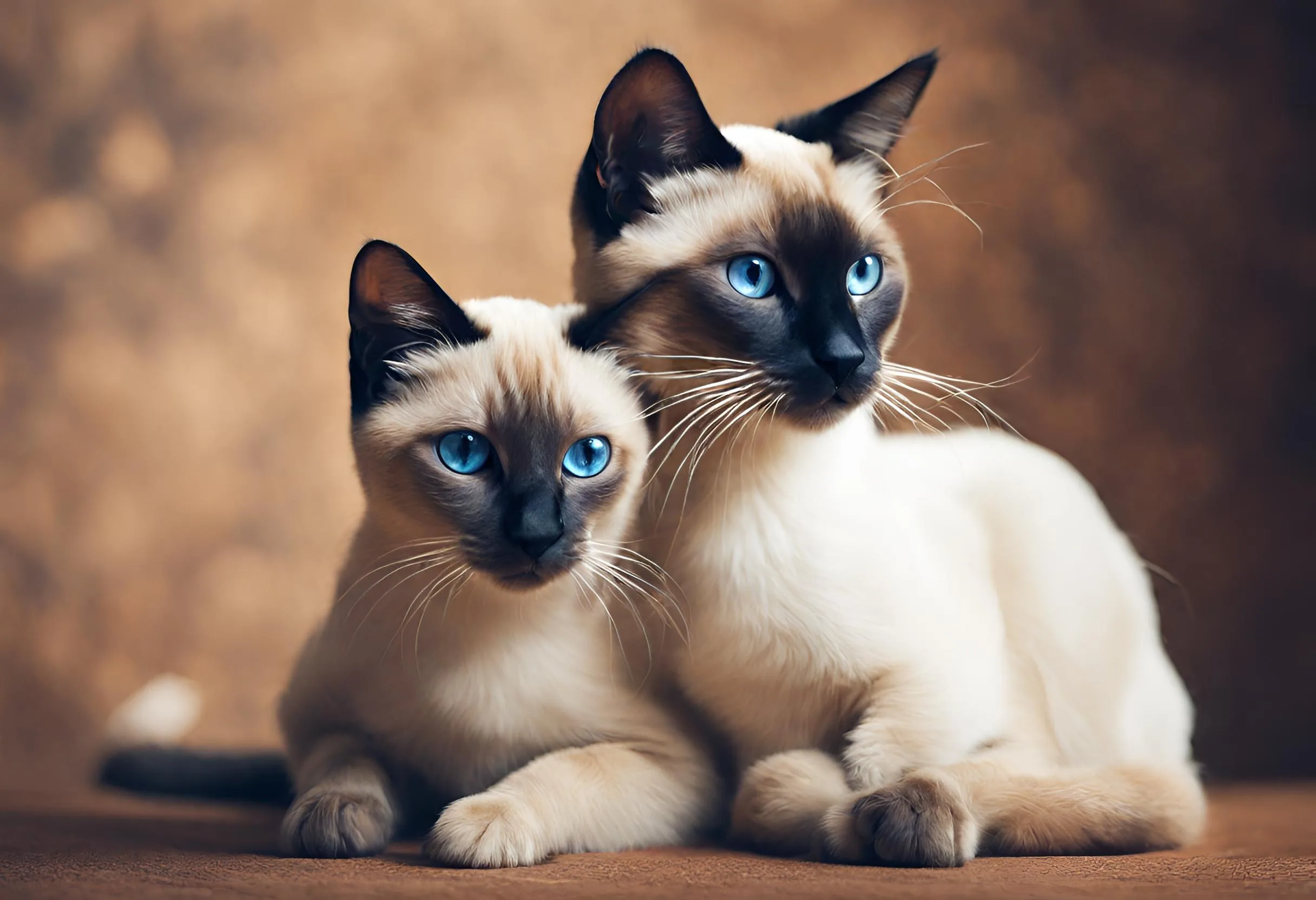Siamese vs. Other Cat Breeds: Thinking about adding a furry friend to your family? Cats are incredible companions, offering a variety of breeds each with its own special allure. Take the Siamese cat, for instance: with its stunning looks and talkative personality, it’s a breed that truly stands out. But, is a Siamese cat the perfect fit for you, or is there another breed that aligns more closely with your lifestyle and preferences? Dive into our comprehensive guide where we spotlight the captivating world of Siamese cats, compare them to other cherished breeds, and assist you in making a well-informed choice for your ideal feline friend.
Table of Contents
The Timeless Appeal of Siamese Cats
Siamese cats have captivated the hearts of cat enthusiasts for generations. To understand whether a Siamese cat is right for you, it’s important to explore their rich history and foundational traits.
A Storied Past
The Siamese cat breed originated in Siam, which is now known as Thailand. These cats were considered regal and were often the companions of kings. Their distinct appearance, with striking blue almond-shaped eyes and a sleek, cream-colored coat with dark face, ears, paws, and tail, made them stand out.
Personality Points
Siamese cats are renowned for their unique personalities. They are known to be highly sociable and often bond closely with their human families. They are intelligent, curious, and very vocal, known to ‘talk’ with their owners in a variety of sounds. The Siamese’s need for attention and interaction makes them best suited for homes with people who can provide ample companionship.
High-Energy Lifestyle
Siamese cats are also quite active. They enjoy climbing, playing, and exploring, and need mentally stimulating environments. Engaging playtime is a must for keeping your Siamese cat happy and out of mischief.
Care Considerations
In terms of grooming, Siamese cats are relatively low-maintenance. Their short coats require minimal grooming, mainly to reduce shedding and keep their skin healthy. Healthwise, the Siamese breed is predisposed to certain conditions such as dental issues, respiratory problems, and some hereditary concerns. Regular veterinary check-ups are essential for maintaining their well-being.
Siamese Cats vs. Other Breeds: The Side-by-Side Comparison

There are cat breeds that share common ground with the Siamese and others that couldn’t be more different. Comparing Siamese cats with other popular breeds can shed light on which cat is the best choice for your home.
Persian
The Persian cat is quite the opposite of the active Siamese. They are calm, gentle, and enjoy lounging over high-energy play. Persians have long, flowing coats that necessitate daily grooming. Health concerns are more prominent in this breed, including polycystic kidney disease, leading to a shorter lifespan on average.
Maine Coon
Maine Coons are the gentle giants of the cat world, weighing on the higher end with a large, robust frame. They are friendly, affectionate, and get along well with children and other pets. Their long, waterproof coats require regular grooming to prevent matting.
Bengal
If you’re seeking a cat with the intelligence and activity level of the Siamese, the Bengal may be a close match. Bengals are energetic, require mental stimulation, and some even enjoy water. Their leopard-like coat patterns come with a silky texture that is easy to groom.
Ragdoll
Ragdolls are known for their placid demeanor and love for human companionship. They are the ‘puppies’ of the cat world, often following their humans from room to room. Their semi-long fur does not mat easily but does require regular combing to keep it looking its best.
Choosing Your Purrfect Match
Making the decision to bring a cat into your life is a serious one, and choosing the right breed is pivotal. Your lifestyle, living space, family dynamics, and personal preferences all play a part in the decision-making process.
Indoor or Outdoor Cat?
Some breeds, including Siamese cats, are better suited for an indoor life due to their vocal tendencies and curiosity. Others, like the Maine Coon, can adapt well to the outdoors. Consider your cat’s safety and the environment when deciding on indoor or outdoor living.
Family Fit
If you have a busy household with children and other pets, you’ll need a cat that’s social and adaptable. The Ragdoll, Siberian, or Maine Coon breeds are known to be good with families. Single individuals or couples may find the more demanding but affectionate Siamese to be an excellent match.
Living Environment
Do you live in a compact urban apartment, a suburban home, or a spacious country estate? The space your cat will inhabit can influence your breed choice. Active breeds require more space to roam and might not be happy in a small apartment, unlike more sedentary breeds such as the Persian.
Personal Preferences
Your own likes and dislikes will play a role in the cat you choose. If you’re an avid talker who enjoys constant feline feedback, a Siamese might be your language-loving companion. On the other hand, if you prefer a cat that’s a silent observer, a breed like the British Shorthair might be more suitable.
Real-World Stories
There is no better way to learn about a cat breed than from the experiences of those who have lived with them. We share some intimate cat stories to provide a broader understanding of the joys and challenges of specific breeds.
Life with a Siamese
Siamese cat owners often share tales of their cats’ intense loyalty and affection. They talk about how their Siamese felines are an integral part of the family, always ready to join in on activities and conversations. However, they also highlight the breed’s vocal nature and the need for constant attention, which might be overwhelming for some.
The Persian’s Silent Love
Persian cat enthusiasts appreciate the breed’s gentle and calming presence. They adore the love and affection Persians give, often through silent companionship. Yet, they also discuss the extensive grooming the breed requires and its tendency to become a couch potato when not given structured playtime.
Maine Coons and Their Loyal Charm
Maine Coon aficionados tell stories of their cats’ amazing adaptability and loyalty. They marvel at the Maine Coon’s ability to get along with just about anyone and their penchant for playfulness well into their golden years. Health issues, especially related to their size, are shared as considerations for potential owners.
Bengal’s Adventures
For those with Bengals, their cat’s limitless energy and love for play are the highlights. They speak of their cats’ fascinating curiosity and acrobatic abilities. However, they also mention the challenge of keeping up with Bengal’s activity level and the need for a cat-safe home that accommodates their playfulness.
In Conclusion
The decision to bring a cat into your life should not be taken lightly. Each breed comes with its own set of needs and characteristics that will impact your daily life and relationship with your pet. By thoroughly understanding the traits of the Siamese cat and comparing them with those of other breeds, you can make an informed choice that will lead to a harmonious bond between you and your feline friend. Remember, the perfect cat is not just about looks or breed, but about finding a companion that fits your lifestyle and your heart.
Explore cat forums, talk to breeders, and visit shelters to gather more information before making your decision. And finally, be open to the joy and surprises that come with every new cat—regardless of their breed. After all, when you adopt, you’re not just choosing a pet; you’re choosing a family member for life.
Frequently Asked Questions (FAQs)
How do I know which cat breed is right for me?
Selecting the right cat breed involves considering your lifestyle, living environment, and personal preferences. Assessing how much time you can dedicate to your pet for activities and grooming can also guide your decision.
Can indoor cats be happy in a small apartment?
Yes, many cat breeds thrive in small apartments as long as their needs for play, companionship, and exploration are met. Providing vertical spaces and engaging toys can enhance their environment significantly.
Are there hypoallergenic cat breeds?
While no cat breed is completely hypoallergenic, some breeds like the Siberian or the Sphynx produce fewer allergens than others, making them a better option for allergy sufferers.
How can I adopt a cat?
You can adopt a cat from local shelters, rescue organizations, or through breed-specific rescues. Some people also choose to purchase from reputable breeders. Whichever route you choose, make sure to consider the cat’s health, temperament, and background.
Is it better to have two cats instead of one?
Many experts suggest that having two cats can be beneficial, especially if the cats are alone for long periods, as they can provide companionship and play for each other. However, this depends on the cats’ personalities and whether they get along.
How long do cats typically live?
The lifespan of a cat can vary significantly based on breed, health, and care. On average, indoor cats live between 12 to 18 years, with many reaching into their early 20s.
How much grooming do cats need?
Grooming requirements vary widely among breeds. Long-haired breeds like Persians require daily grooming to prevent mats and tangles, while short-haired breeds may only need occasional brushing.
Can I train my cat?
Yes, cats can be trained using positive reinforcement and patience. Training can include using the litter box, scratching posts, and even performing tricks or walking on a leash.
Read more interesting articles about Siamese cat, visit our website factivaa.com.

